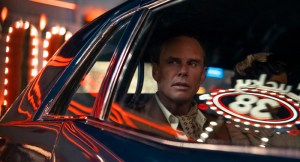Total Recall: Go All In with These Gambling Movies
Play your cards right with Dr. Mabuse, Maverick, and Rounders.
Gambling is a great central theme for a film, if for no better reason it’s full
of drama, deceit, and the occasional reason to look at someone (hopefully
someone hot) under a table. With the appearance of
21 in theaters, we
thought it time to run through some of our personal highlights in the universe
of gambling movies.
Sure, you can throw a rock and hit an iffy gambler or thug at the tables (Scorsese‘s
Casino made that point perfectly clear) but the enduring lure of the
gambler revolves around his (or her) prowess at the game — which, if we
remember Rounders, has little to do with luck and lots to do with being
one step ahead. Card players (especially sexy ones) are the intellectual
equivalent of the football player: They have to see the plays coming from yards
away but when the play approaches their move should be liminal and give nothing
away. The gambler’s tricks mingle the cool of social skill and the intellect of
strategy with monk-like intensity. It’s no wonder James Bond played Baccarat —
icons are always enigmatic.
 The
The
titular character of the
Fritz Lang classic
Dr. Mabuse, Der Spieler (1922, 89 percent on the Tomatometer) is a master of magnetism, a hypnotist, an actor, an
impersonator with multiple identities and, of course, a gambler. The most common
translation of the title is Dr. Mabuse the Gambler, but “spieler”
literally means “player” — and that implies all Mabuse’s acts, not simply what
he does at the card table. While dealers in the upper-class vice dens of Weimar
Germany dole out cards, Mabuse (in crosscut) is shown playing his own game of
solitaire with a stack of IDs. This isn’t just about poker face — Mabuse is one
man playing a thousand and that puts a twist on his game. Lang constructs this
treatise on identity and the image while fully entrenched in his own, time
tested anxieties (death, authenticity, modernity).
Though its four-hour
running time (there are multiple versions on DVD) might seem daunting, the pic
is as magnetic as Mabuse himself, full of complex intrigue and ideas to untangle
— which is probably why it became such a successful serial in Germany, spawning
continuations. Keith Ulrich of Slant said, “Mabuse is a true bogeyman, a
hollow shell of surface tics with a terrifying dead-eyed stare.” Well, that’s
one way to describe a poker face.

 Not
Not
all iconic movie gamblers are menacing. Take
Maverick (1994, 69 percent), for
example. The New York Times‘ Caryn James said, “You don’t have to know
anything about poker to guess that even away from the table, everyone in Maverick
is bluffing all the time.” James’ quote strikes two major chords: Firstly, the
film is as much about gambling as
Margot at the Wedding is about floral
arrangements. Secondly, while the highest drama in Maverick happens at
the tables, bluffing and raising are practices just as actively pursued without
cards at play.
Inspired by the TV show of the same name,
Richard Donner‘s direction big-ups all
the conventions Westerns turned to cliché — but Donner does it in a gently
ironic way that makes all the Wagon-hanging, garter-gun-hiding hi jinx play well
for the megaplexes. Best of all is the way
Mel Gibson (then at the post-Lethal
Weapon height of fame) plays dumb to get his way. It’s an easy game that he
doesn’t do as well as his adversary/love-interest
Jodie Foster (sporting an off-southern accent) but it’s charming, and what’s a poker game without a little
flirtation?
 The
The
tension between the players is what drives
Rounders (1998, 64 percent). Right
after Good Will Hunting,
Matt Damon was a hot commodity with everywhere
to go — not unlike his character in
John Dahl‘s neo-noir. Damon’s Mike
McDermott was years reformed from a career in poker when he opts to return in
order to help a friend pay off a loan shark. Time Out said, “Powerhouse casting
is the film’s strong suit,” but its abundant Indiewood cast isn’t its lone claim
to fame.
Rounders did for poker picture what
The Asphalt Jungle did
for heist movies: it proves the specifics can be interesting. Most gambling
films skate right past gambling into the intrigue of cold reading or the quippy
play of bluffing, but not Rounders. Advised by a small army of
professional poker players, McDermott’s line, “it’s a game of skill,” echoes as
much in the dank corridors of New York’s underground dens than in the cavernous
halls of Las Vegas’ Bellagio. More famous is his incantation: “If you can’t spot
the sucker in the first half hour at the table, then you are the sucker.”
If
you need more to get your gambling fix, consider watching
John Garfield take a
punch in Robert Rossen‘s
Body and Soul (100 percent), or see
Elliot Gould
and George Segal get dicey in
Robert Altman‘s
California Split (90
percent). If you’d rather root for some sexy criminals maybe consider some
vintage Redford and
Newman in
George Roy Hill‘s
The Sting (93 percent),
Sterling Hayden in
Kubrick‘s
The Killing (1956, 96 percent) or
Sharon
Stone in Scorcese’s Casino (83 percent).






